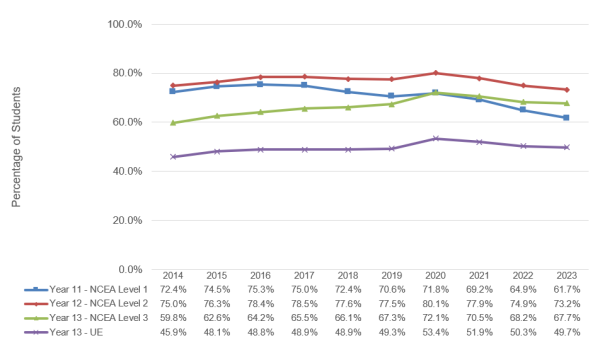The New Zealand Qualifications Authority (NZQA) has released finalised data from 2023, showing that while NCEA attainment has declined overall from 2022, NCEA Level 3 and University Entrance by Year 13 students was similar to 2019 pre-COVID levels.
“While attainment at all levels of NCEA and University Entrance (UE) has declined compared to 2022, attainment of NCEA Level 3 and UE remains slightly higher than in 2019 – the last pre-COVID year,” says NZQA Deputy Chief Executive Assessment, Jann Marshall.
Level 1
Overall attainment of NCEA Level 1 amongst Year 11 students has been decreasing over the last five years, dropping by 3.2 percentage points between 2022 and 2023, and 8.9 percentage points between 2019 and 2023.
“This reflects the continuing trend of some schools moving away from offering a full NCEA Level 1 programme in Year 11 and working towards achieving NCEA Level 2 over two years,” Jann Marshall says.
“A survey of schools by NZQA in late 2023 showed that 25% of schools were not planning on offering a full assessment programme leading to NCEA Level 1 for their Year 11s this year. While it is optional for schools to offer NCEA Level 1, it remains the highest qualification held by around 10% of school leavers,” Jann Marshall says.
Levels 2 and 3
Attainment of NCEA Level 2 amongst Year 12 students decreased by 1.7 percentage points from 2022 (and by 4.3 percentage points compared to 2019); while attainment of Level 3 in Year 13 declined by 0.5 percentage points from 2022 (and increased by 0.4 percentage points compared to 2019).
“The decrease in attainment at NCEA Level 2 may partially reflect the ongoing effects from COVID-related disruption,” Jann Marshall says.
University Entrance
The change in awards of University Entrance has continued to be relatively flat, decreasing by 0.6 percentage points from 2022 but increasing 0.4 percentage points from 2019.
Equity
While Māori student attainment has lifted slightly at NCEA Level 2, Level 3 and UE in 2023 compared to 2022, Pacific student attainment has declined at NCEA Levels 1 and 2 compared to 2022, and is slightly higher at NCEA Level 3 and UE.
“While there are some positive movements, a significant underlying equity gap remains between Māori and Pacific students, and their European and Asian classmates at each level of NCEA,” Jann Marshall says.
“Māori and Pacific students are still awarded University Entrance at around half the rate of their European and Asian peers. NZQA and the New Zealand Council for Educational Research (NZCER) will soon release a report looking at how some schools are successful in supporting more equitable outcomes in UE,” Jann Marshall says.

NZQA anticipates releasing its Annual Report on NCEA, University Entrance and New Zealand Scholarship Data and Statistics in early June 2024.
See the final NCEA and UE attainment data from 2023.
Reporting on attainment by school equity index group replaces reporting on attainment by decile band in this report.

